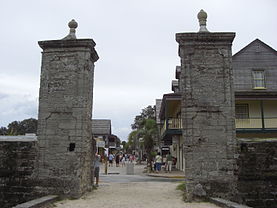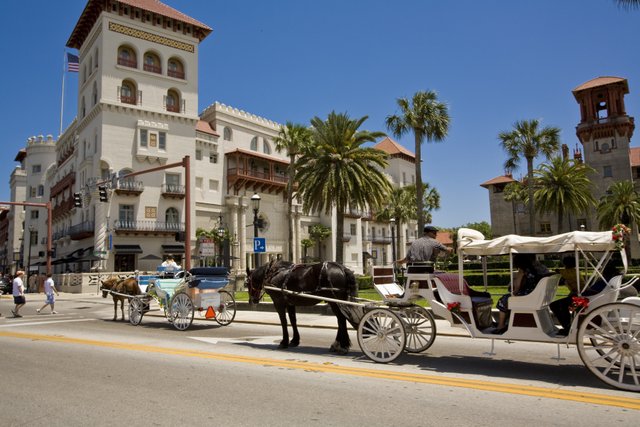The cobbled street of San Agustin, Florida
A visit to San Agustín, Florida, is touching history. 453 years of the first continuous settlement in North America celebrate the spirit of survival and cultural diversity. The first inhabitants of the USA, after the Amerindians, were Hispanic Americans and African-Americans. In San Agustín, in 1565, the first Catholic church was built and the first cabildo was formed. Pedro Menéndez de Avilés founded the colony for the Spanish crown, in territory already discovered by Ponce de León, in 1513. With soldiers, artisans, Hispanic families and a group of African slaves, who lived with the indigenous people, Menéndez de Avilés expelled the French and rescued the territory for Spain.
The fabulous era
Conquerors, pirates, businessmen and defenders of equality, converge in the rich and peculiar history of the American city. In the seventeenth century, the vulnerable settlement was protected from attack by pirates, with the construction of the castle of San Marcos. San Agustín was 256 years old when the United States of North America took possession of the Province of East Florida. On July 10, 1821, at the sound of cannon fire, the banner of stars replaced the Spanish flag, at Fort San Marcos. The Americanization produced a growth of the zone. After the civil war, Florida became a visible point in the tourist guides. Threatened by the cruelty of their winters, visitors from the north began to enjoy the pleasant weather. The entrepreneur Henry Morrinson Flager, became the symbol of the Iberian renaissance. He revived in his majestic hotels, the Spanish style. Centuries after its foundation, the city was a bastion for the first free blacks and a hotbed for the struggle of human rights and equality.
The present
San Agustín, with its bucolic appearance of old buildings and Spanish heritage, is a popular place to enjoy a pleasant and historical tourism. A must-see is San Marcos Castle, built with a mixture of shells and coquina stone (almost indestructible material), brought from the nearby island of Anastasia. The fort is typically Spanish. The structure was remodeled by curators who - respecting the past - did not forget modern facilities for tourists. which far from obstruct the historical rhythm of the place, invigorate it. Excellent reading material with trained guides service, complement the offer.
For the most daring, San Agustín also has tours and tastings in distillery and wine shop, produced in the area. The #STADistillery is located in an old building that once housed one of the first ice factories of the place, in 1925. Trying whiskey, rum, vodka or gin, is intoxicating. Do not forget to reserve space in your body, for the test of -at least- eleven wines from the winery. The offer in restaurants is also very varied in the small Spanish grid, surrounded by cobbled streets and huge stone houses with balconies. While tasting the gastronomy, on a terrace facing the bay of blue-green water, relives the extraordinary chronicle of the New World, the establishment of Christianity and the development of what -eventually- would be the United States.
 Xiomary Urbáez
Xiomary Urbáez
Venezuelan journalist and writer, author (among other books) of Catalina de Miranda, finalist for the Ibero-American Casa de América-Planeta 2012.
